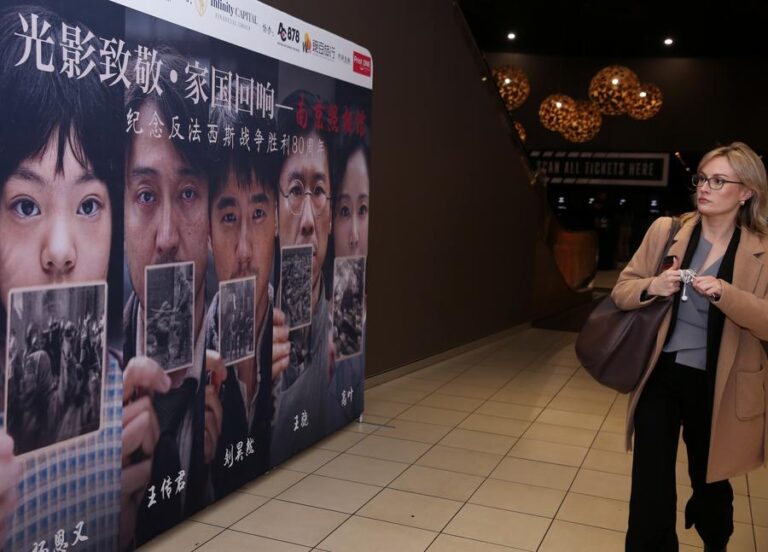Chinese Ambassador to the United States Xie Feng said that the film transcends time and space, revealing the darkest corners of history while also shining a light on the best of human conscience and reminding us of the cruelty of war and the preciousness of peace.
by Xiong Maoling, Hu Yousong
WASHINGTON, Aug. 9 (Xinhua) — The North American premiere of “Dead To Rights,” a Chinese historical film about the 1937 Nanjing Massacre, was held Wednesday night at a cinema near Washington, D.C., resonating strongly with the audience.
Drawing on verified photographic evidence of Japanese wartime atrocities during the Nanjing Massacre, “Dead To Rights” tells the story of a group of Chinese civilians who seek refuge in a photography studio during the brutal occupation of the Chinese city of Nanjing by Japanese aggressors.
When the screening ended, the theater fell into complete silence, the air heavy with solemnity.
“Japan, apologize!” a member of the audience suddenly shouted, breaking the stillness. Many people, their faces still streaked with tears, seemed lost in emotion and remained seated long after the film ended.
Mr. Ma, originally from Anhui province near Nanjing and now working at the World Bank, told Xinhua after watching the film that he felt a deep heaviness in his heart.
Although many years have passed since the war, Japan continues its attempts to erase history and deny its wartime atrocities, Ma said.
Ma expressed hope that more people would see the film so that the world would remember the Massacre’s tragic history.
Echoing his view, David Huang, veteran journalist and founder of World Today Television, a Chinese-language TV channel based in the United States, noted that to this day, Japanese textbooks, literary works and news media continue to deny history and downplay Japan’s wartime aggression in China.
Huang said the film should be produced in several languages to reach a broader audience and reveal the truth.
The massacre lasted for more than 40 days following the Japanese troops’ capture of Nanjing, the then Chinese capital, on Dec. 13, 1937, leaving more than 300,000 Chinese civilians and unarmed soldiers dead and 20,000 women raped.
Zhao Jie, who has lived in the United States for more than 20 years, told Xinhua that “our generation will never forget this.”
“Chinese descendants in the United States should never forget their roots,” Zhao said.
Chinese Ambassador to the United States Xie Feng attended the premiere, watching the film together with overseas Chinese and others to jointly commemorate the 80th anniversary of the Victory in the Chinese People’s War of Resistance Against Japanese Aggression and the World Anti-Fascist War.
In his remarks, Xie said that the film transcends time and space, revealing the darkest corners of history while also shining a light on the best of human conscience and reminding us of the cruelty of war and the preciousness of peace.
Xie pointed out that those who forget history are doomed to repeat it. “The Chinese people nationwide united as one, fought heroically, and won the War of Resistance Against Japanese Aggression with tremendous sacrifices, making an indelible contribution to the victory of the World Anti-Fascist War,” Xie said.
“The 1.4 billion Chinese people will never tolerate any attempt to tamper with the history of WWII, and all the peace-loving people in the world will never accept any move to turn back the wheel of history,” he said.
The Chinese ambassador also stressed that remembering history means paving the way to a brighter future. “During the war, the Chinese and American people fought shoulder to shoulder to defend peace and justice. In this era of peace, China and the United States have only the shared responsibility to safeguard peace, and no single reason for conflict and confrontation,” Xie said.■

